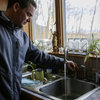Two asymptomatic teens contract B.1.1.7
ALBANY COUNTY — The push to vaccinate against COVID-19 continues as two cases of B.1.1.7, the highly transmissible variant first identified in the United Kingdom, have been confirmed in Albany County.
“These cases were identified in a congregate youth facility,” said Albany County Health Commissioner Elizabeth Whalen at Monday morning’s county press conference.
“Both cases were teenagers and both of them were asymptomatic,” she said.
The testing was done by the state after an initial case at the facility was identified. Whalen said the state would conduct additional tests at the facility on Monday, which may be expanded if more cases are found.
Whalen noted that, in general with COVID-19, younger people have a higher prevalence of mild disease or asymptomatic disease. The concern, she said, is it could affect more vulnerable individuals and cause more serious complications.
So far, she said, 82 cases of B.1.1.7 have been confirmed in 17 counties throughout the state; Albany County makes it 18.
“There have been predictions that, by late March, the predominant strain could be the U.K. variant so this is of concern …,” said Whalen. “This strain of the virus is more contagious and could likely result in more infections.”
Whalen said it is “essential” for residents to continue following protective measures like masking — double-masking in some circumstances — hand-washing, and avoiding gatherings.
New York State’s first confirmed case of B.1.1.7 — contracted by a man in his sixties in Saratoga — was announced on Jan. 4.
On Saturday, Feb. 13, Governor Andrew Cuomo had reported that 11 new cases of the B.1.1.7 variant of COVID-19 had been identified in New York State.
Eight of the new B.1.1.7 cases were in New York City, two were in Suffolk County, and one was in Rockland County — that county’s first case.
That brought New York’s total of then-known cases of the B.1.1.7 variant to 70 — in New York City and in these counties: Saratoga, Warren, Onondaga, Nassau, Suffolk, Westchester, Rockland, Ulster, Essex, Jefferson, Tompkins, Allegany, and Niagara.
As of Feb. 21, the Centers for Disease Control and Prevention’s nationwide tally was 1,661 cases identified in 44 states — including 82 in New York State. Florida had the most cases with 433, followed by Michigan with 210, and California with 195.
The CDC tally is updated on Sunday, Tuesday, and Thursday by 7 p.m.
Originally, scientists thought that the B.1.17 variant, while more transmissible — the CDC had predicted it could become the predominant variant in the United States by March — was not more severe. Recently, however, British scientists have reported “updated and additional analyses, which together strengthen the earlier finding of increased disease severity in people infected with VOC B.1.1.7 compared to other virus variants.”
On Feb. 12, the New and Emerging Respiratory Virus Threats Advisory Group posted documents that have not been peer reviewed, indicating that the B.1.1.7 variant may be linked to increased hospitalization and death.
According to the CDC, “In January 2021, experts in the UK reported that B.1.1.7 variant may be associated with an increased risk of death compared to other variants. More studies are needed to confirm this finding.”
Vaccination
The state and federal governments together have opened mass vaccination sites for Black and brown communities, which have disproportionately been hurt by the pandemic.
One of those sites is at the Washington Avenue Armory in Albany. Appointments begin on March 3 for residents of these ZIP codes: 12202, 12206, 12207, 12209, and 12210.
Residents of those ZIP codes can sign up to schedule an appointment to get vaccinated by going to Albany County’s website at www.AlbanyCounty.com.
For the first week, only residents of those ZIP codes are eligible for appointments at the armory. The site is to vaccinate 1,000 people each day.
“We’ve been seeing the impact on minority communities,” said Albany County Executive Daniel McCoy at his Monday morning press briefing as he announced the ZIP codes.
He also noted the partnership that the county and city of Albany have with Mohawk Ambulance has been successful in reaching low-income residents who are homebond.
“We just need the state to give us more …,” said McCoy. “We need to address this issue with people who are homebound.”
“We are working with the state to ensure vaccine equity,” said Whalen. “We are working with communities we know are vulnerable.”
The state will work with a list the county has developed, Whalen said. She urged community-based organizations in the designated ZIP codes to reach out to eligible residents and encourage them to get vaccinated.
Winter storms last week disrupted deliveries of vaccine doses across the nation, including to Albany County.
Whalen said that, on Monday morning, Albany County received 2,900 doses and will schedule a second-dose clinic, originally planned for last Thursday, Feb. 11, for Wednesday, Feb. 24, from 4 to 7 p.m. The appointments will be at the same hour as the originals.
The clinic will be held at the Times Union Center in Albany and residents who had signed up for vaccinations will be notified through email, robo calls, and the county’s website.
The county is then planning two clinics at the Times Union Center on Thursday, one for first doses and the other for second doses. A link for signing up will be released on Tuesday at 5 p.m.
The county clinic continues to be able to vaccinate just two categories of residents — 1b essential workers and those with comorbidities listed by the state.
“I think this coming month there is going to be a tremendous increase in the amount of vaccine available in the Capital Region,” said Whalen
She urged, “Get vaccinated when it is your turn … This vaccine is safe and effective and … will protect you from getting serious disease, from being hospitalized. In some cases, it could save your life.”


